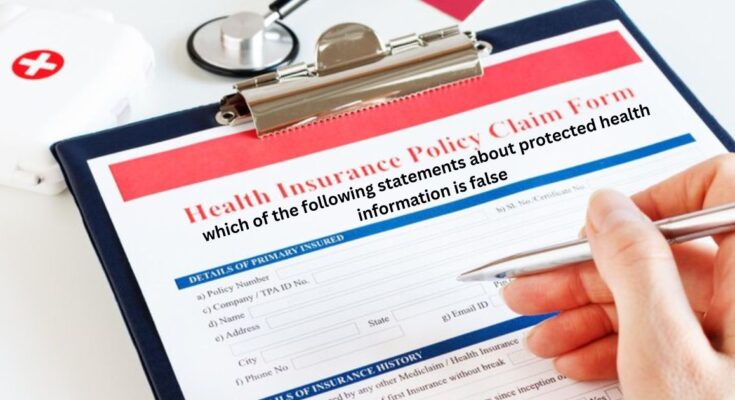Introduction
Regarding privacy in healthcare, one question often arises: Which of the following statements about protected health information is false? In today’s digital world, where medical data can be shared with a click, it’s vital to understand how your information is handled. Protected Health Information (PHI) is a critical concept under the Health Insurance Portability and Accountability Act (HIPAA), yet many misunderstand its scope. This article will guide you through the facts and help identify the falsehoods.
What is Protected Health Information (PHI)?
Before answering which of the following statements about protected health information is false, we need to understand what PHI means.”PHI refers to any information that can identify a person and is connected to their health condition, medical treatment, or healthcare payments.” This applies whether the data is on paper, spoken, or stored electronically. It ensures that everything from a diagnosis to a billing record is safeguarded.
Common Statements About PHI – Which One is False?
To determine which of the following statements about protected health information is false, let’s explore a few commonly believed claims about PHI and separate truth from fiction. Many people believe they understand HIPAA regulations, but small misconceptions can lead to big consequences in real-world healthcare scenarios.
1. PHI only applies to electronic records.
This is the statement that is false when we ask, which of the following statements about protected health information is false. PHI is not exclusive to electronic formats; it applies equally to paper documents and even verbal exchanges. A printed prescription or a conversation with your doctor about your condition is just as protected under HIPAA as a digital health file stored on a server.
- PHI includes demographic data like name, address, and birthdate.
“This statement is accurate, and recognizing it helps determine which of the following statements about protected health information is false.”. PHI isn’t limited to clinical details—it includes personal identifiers that connect health data to an individual. Even a combination of your ZIP code and date of birth can fall under PHI if it’s tied to health information.
3. Only healthcare providers are responsible for protecting PHI.
Here’s another opportunity to evaluate which of the following statements about protected health information is false. This one is false because the responsibility doesn’t rest solely on doctors or nurses. Business associates like billing companies, IT service providers, and even contractors must also protect PHI if they interact with it. HIPAA regulations apply to all entities involved.
4. Patients have the right to access their PHI.
When trying to determine which of the following statements about protected health information is false, this one stands out as true. HIPAA ensures that every patient has the right to inspect and request copies of their PHI. Healthcare providers must comply with such requests promptly, usually within 30 days.
5. PHI can be shared for treatment, payment, and healthcare operations without patient authorization.

This statement is also true, and knowing this helps us pinpoint which of the following statements about protected health information is false. Healthcare providers can share PHI without explicit consent for purposes like treatment coordination, billing, or quality assessments. However, for anything outside these standard
operations, like marketing, authorization is required.
HIPAA Violations and Their Consequences
Understanding which of the following statements about protected health information is false also means recognizing the weight of HIPAA violations. If PHI is accessed, used, or shared improperly, the consequences can be severe. Civil penalties can go up to $1.5 million annually, and in extreme cases, criminal charges may apply. “Improper handling of PHI, whether done knowingly or by mistake, can damage trust and lead to legal consequences.”
How PHI is Protected
To avoid situations where someone may wonder which of the following statements about protected health information is false, it’s helpful to understand how PHI is protected. “HIPAA requires the implementation of three types of protection measures: administrative, technical, and physical.” These include secure logins, encrypted communication, employee training, and locked storage spaces.
PHI vs. ePHI: Know the Difference
Many people confuse PHI and ePHI, which is why they may struggle with questions like which of the following statements about protected health information is false. “ePHI refers to protected health information that is shared or kept in electronic form.”. The HIPAA Security Rule adds extra safeguards to ensure ePHI remains confidential during digital transmission and storage.
When PHI Can Be Disclosed Without Consent
Another area where confusion leads people to ask which of the following statements about protected health information is false is regarding disclosure. While authorization is usually required, there are exceptions. PHI can be disclosed without consent in cases of public health emergencies, legal investigations, abuse reports, or to reduce a serious threat to health and safety. Each scenario is narrowly defined and regulated.
“Ways Patients Can Safeguard Their Health Information”
Knowing which of the following statements about protected health information is false empowers you to be proactive. As a patient, you can help protect your PHI by reading privacy policies, limiting how much personal data you share, and communicating only through secure channels. If something feels off, like unexpected medical bills or a suspicious call, it’s smart to report it immediately.
Conclusion
Now that we’ve examined several statements, it’s clear which of the following statements about protected health information is false: the claim that PHI only applies to electronic records. HIPAA protects PHI across all forms—verbal, written, and digital. “Not fully understanding this can result in privacy violations and potential legal trouble.” Whether you’re a healthcare professional or a patient, understanding PHI regulations is crucial in safeguarding sensitive health data.



